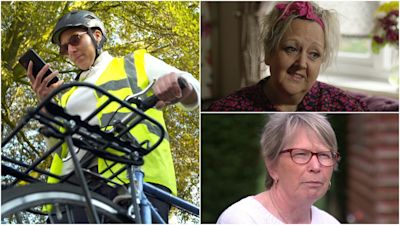Covid: Exclusive research for ITV News finds women are bearing the brunt of lockdown financially and emotionally

Video report from ITV News Correspondent Juliet Bremner; words by Business and Economics Producer Mariah Hedges
One year on, furlough has destroyed Karen Brain’s sense of self.
"I've not been in a workplace for a year. Your confidence goes down. I'm on the edge all the time," she says.
Karen’s mental health has drastically deteriorated over the past year. A hard-working single mum, her life has changed unrecognisably.
She now struggles to leave the house or walk her daughter to school due to the paralysing anxiety caused by the coronavirus pandemic.
Karen earns the minimum wage in her travel sales job and relies on her monthly commission to get by.
Over the last year Karen has had to manage on 80% of her basic pay to feed her two children, something she has struggled to do.
She told me she feels like a failure as a mother and as a woman.
She said: "You try to make ends meet. I am a single mum, you're working, you're paying your rent.
"You're doing everything, what you’re supposed to be doing. And it's still not enough. I want to be a role model for my daughter."
Karen is not alone.
Exclusive research for ITV News by Professor Tracey Warren and Dr Luis Torres from the University of Nottingham, and Professor Clare Lyonette from the University of Warwick has found that women on low pay have borne the brunt of the pandemic both financially and psychologically.
The research found:
Working class women were more likely to be furloughed than women in management and professional jobs.
Working class women were much more likely than management, professional or intermediate women workers to be either key workers or furloughed by November.
Working class women were much more likely than women in management, professional or intermediate jobs to have hours of work reduced to zero and that continued through 2020.
People working in distribution, hotels and restaurants were most impacted by redundancies in 2020, with women more affected than men in that sector.
The gender pay gap remained between 31% and 35% during 2020, but the gap is wider for working class women than for women in supervisory or managerial roles.
All working women were far more likely than men to have low weekly earnings in 2020.
Working class women were almost twice as likely as management and professional women workers to report experiencing financial hardship
Women are the majority of those working in sectors worst affected by the lockdown, such as retail, hospitality, and leisure.
They also make up the bulk of the low paid workforce behind the services that have kept us going through the crisis from social care workers to cleaners and shop assistants.
Low paid women were much less likely to be able to work from home.
Sixty percent of key workers are female and work disproportionately in customer and patient facing jobs, bringing a greater exposure to health risks at work.
Rachel Goodwin, loved her supermarket customer assistant role. But now work feels her with dread.
"Since the pandemic I’ve experienced stress like never before," she said.
"I’ve taken on extra caring responsibilities for my dad and I had to go into work."
She added: "I’ve never experienced anxiety before. I’ve always been quite happy to walk into work. But the physical act of doing so made me feel anxious and worried."
When it comes to caring roles, Ms Goodwin said the impact on women has always been disproportionate.
"Over the years, things have improved when more men have taken their share but ultimately it does still tend to fall on a wife and mother to keep everything together," she said.
Women’s wellbeing has also been hit harder.
Women reported significantly higher anxiety and psychological distress than men since the start of the pandemic.
Kenya Jay Scarlett’s life has changed dramatically in the last year.
The pandemic wiped out Kenya’s source of income as a freelance audio technician. She now works in the gig economy.
A courier role was one of the few jobs available but the nature of the insecure work and safety problems she faced on the road including sexual harassment led the 26-year-old to have a nervous breakdown.
Despite providing an essential service Kenya feels that gig economy workers have been forgotten.
"I think there are a lot of people not understanding what it's like for people who are key workers," she said.
"It's physically and mentally draining. I just wish more people were aware of what we're going through and the struggles we go through."
Mary-Ann Stephenson, Director of the UK’s Women Budget Group says that the government needs to act urgently to tackle the unequal economic and domestic impact of the Covid-19 pandemic.
She said: "The government needs to match their ‘key worker’ rhetoric with proper recognition in the form of living wages and decent working conditions and security, and ensure that working-class women are not forgotten in the economic recovery plan."